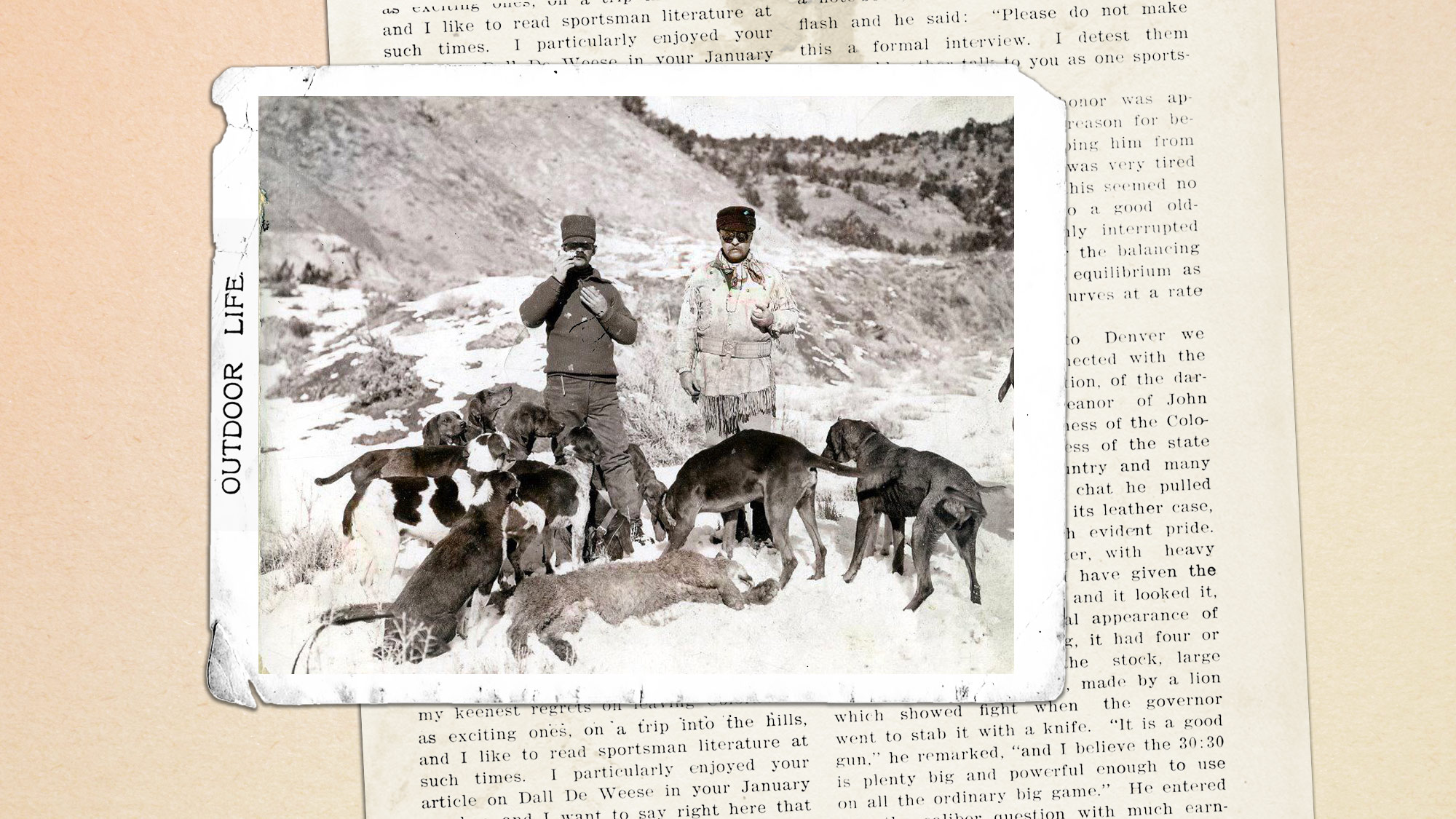By the time this story ran in the March 1901 issue of Outdoor Life, Theodore Roosevelt had been sworn in as the Vice President of the United States under President William McKinley. In this story, he’s still referred to as Governor Roosevelt. Roosevelt’s tenure as the governor of New York State concluded Dec. 31, 1900.
THEODORE ROOSEVELT is not only a natural man of the people, and an unassuming, honest, fearless and intrepid fighter for what he considers just, but he is as deep a lover of the hills and streams, and the free and unconventional life of the frontier as Nimrod, Izaak Walton or “Nessmuk.” To meet Roosevelt as a sportsman is to meet him upon the foothold of man to man. There certainly never lived a more rigid follower of the ethics of true sportsmanship than he, and certainly none more inclined to cast off conventional manners and social dignity while in the hills.
Like my brethren of Colorado, I had learned during the past fall of his intended trip to Colorado with pleasure and pride. I concluded immediately that he would get his share of game, and get it in the ordinary way, for he has killed lots of big game before, including animals requiring more prowess and skill than mountain lions. But, no sooner did our vice-president-elect invade the borders of our game fields than there was immediately set a-going the grandest pyrotechnic display of camp lies imaginable. Reporters were hurried to Meeker, while others ventured as far into the borders of Coyote Basin as their time permitted, only to return to Meeker and concoct such an agglomerated mess of missfit stories as was never before heralded to an American public. This feature of the hunt was certainly no credit to Colorado.
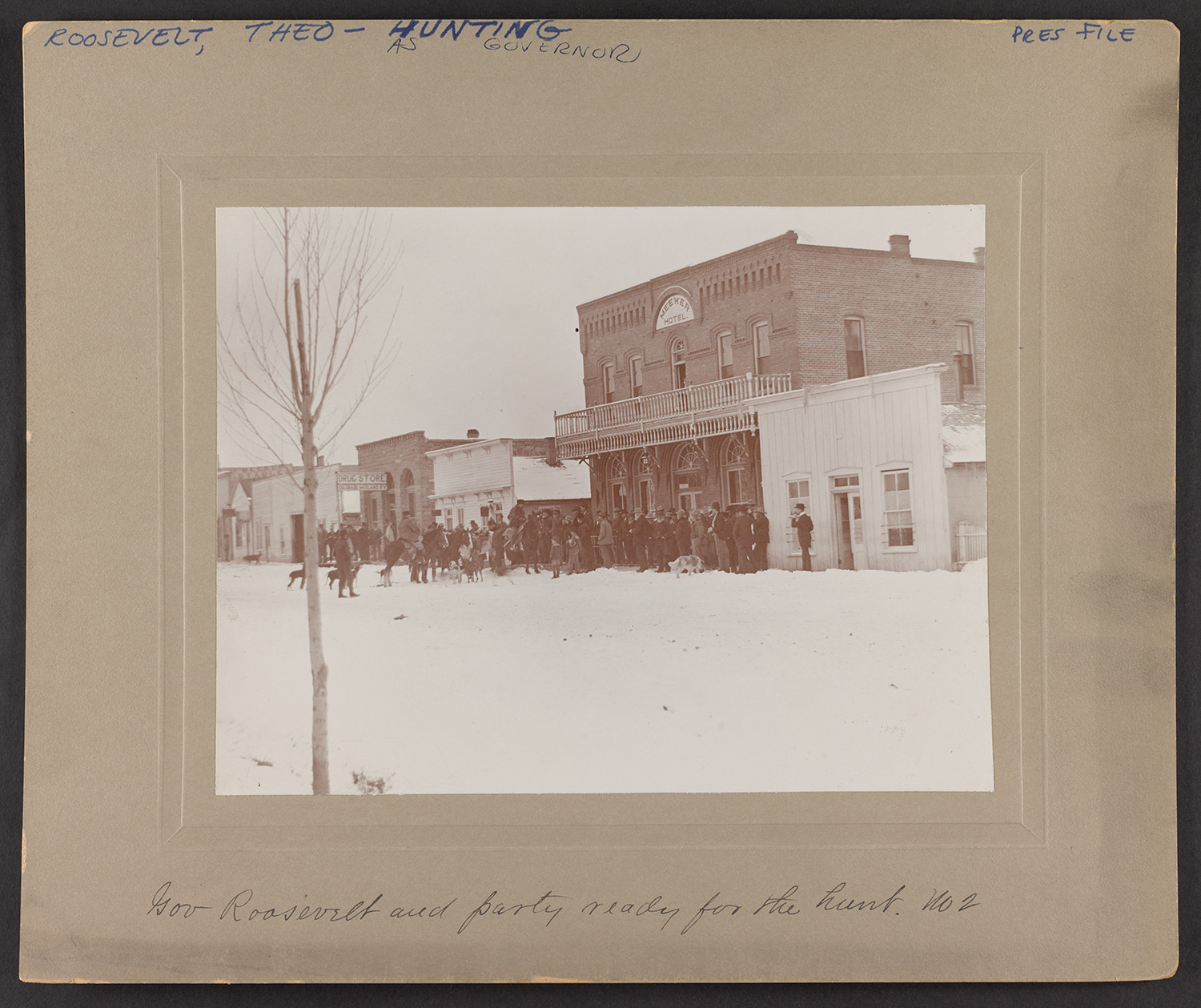
The governor’s trip was a success from start to finish. He killed twelve lions and five lynx during the five weeks that he was hunting, a record certainly to be proud of. Everything possible conducive to his comfort and pleasure was done, and hospitality was lavished on him as profusely by the residents of the towns and cities of the state through which he passed as by the ranchmen and farmers of Routt and Rio Blanco counties. He had what I consider the best guide in this country, a man with whom I have hunted over the deer and elk country of the White River—a sportsman from the soles of his feet to the crown of his head, and a man who has probably had more experience hunting big game than any other in America—John B. Goff of Meeker, Colo.
Read Next: President Teddy Roosevelt’s 1904 Colorado Bear Hunt, According to His Guide
Governor Roosevelt arrived in Colorado Springs on January 10, where he was met by P.B. Stewart and Dr. Webb, who accompanied him to Meeker, going by rail to Rifle, and thence forty-five miles by stage to Meeker. Here they were met on the 12th by John B. Goff, the guide, and were immediately piloted to the Keystone Ranch, twenty-seven miles from Meeker, where they remained a great deal of the time. Dr. Webb and Mr. Stewart returned home after a stay of three weeks, but Mr. Roosevelt remained with Goff, changing the location of their hunting grounds from ranch to ranch, according to the advantages offered, until February 15. Then they returned to Meeker, where the governor took the stage to Rifle and the train from there to Colorado Springs, arriving at the latter point on February 18. On the morning of the 18th he was accompanied by a coterie of Colorado Springs sportsmen on a coyote hunt, on which thirty-five miles were covered, but without success, although three coyotes and a wolf were sighted. On the morning of the 19th they arose early and started in quest of the same game, taking their lunches and intending this time to remain all day if it were necessary in order to “hang a hide.” But, although they did not return to the Springs until 4 p. m. on the 19th, after covering over forty miles on horseback, they were unable to reverse the luck of the previous day. The governor departed on a special at 6:45 on the same evening over the Colorado & Southern railway, to Denver, from which point he left direct for his home at Oyster Bay, Long Island, N.Y.
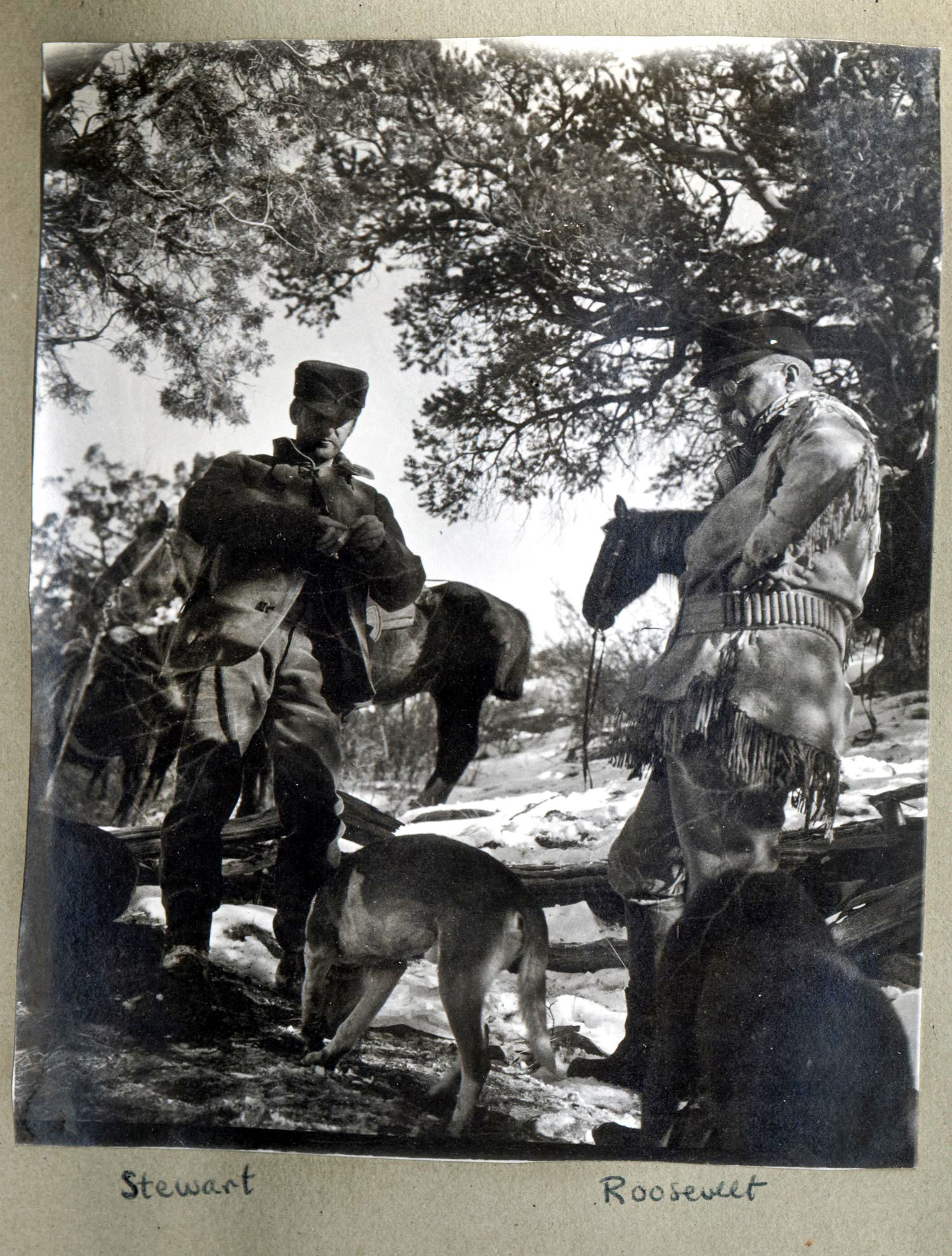
I was one of the few who were fortunate enough to meet Governor Roosevelt while in Colorado. When he boarded his “special” at Colorado Springs on the evening of his departure I mounted the platform, pulled out a card, asked for “a five-minute talk,” handed the card to the porter, and was pleased when the latter returned with a pleasant “Come right in, sir.”
I was agreeably surprised to learn on meeting Mr. Roosevelt that an introduction was out of the question. He grasped my hand warmly, insisted on my sitting down and visiting with him, and remarked immediately in the language and tone known to all sportsmen: “Mr. McGuire, I do not want you to be formal with me, I won’t have it. I have read and admired your magazine for a long time. In fact, I can heartily say that it was one of the most pleasant companions I had on my hunt. For, you know, there are lots of dull days, as well as exciting ones, on a trip into the hills, and I like to read sportsman literature at such times. I particularly enjoyed your article on Dall De Weese in your January number, and I want to say right here that he is a man after my own heart—a typical sportsman and an ideal hunter. One of my keenest regrets on leaving Colorado is to go away without having had the pleasure of becoming personally acquainted with him.”
At this point I pulled from my pocket a note-book, but his hand went up like a flash and he said: “Please do not make this a formal interview. I detest them and would rather talk to you as one sportsman to another.”
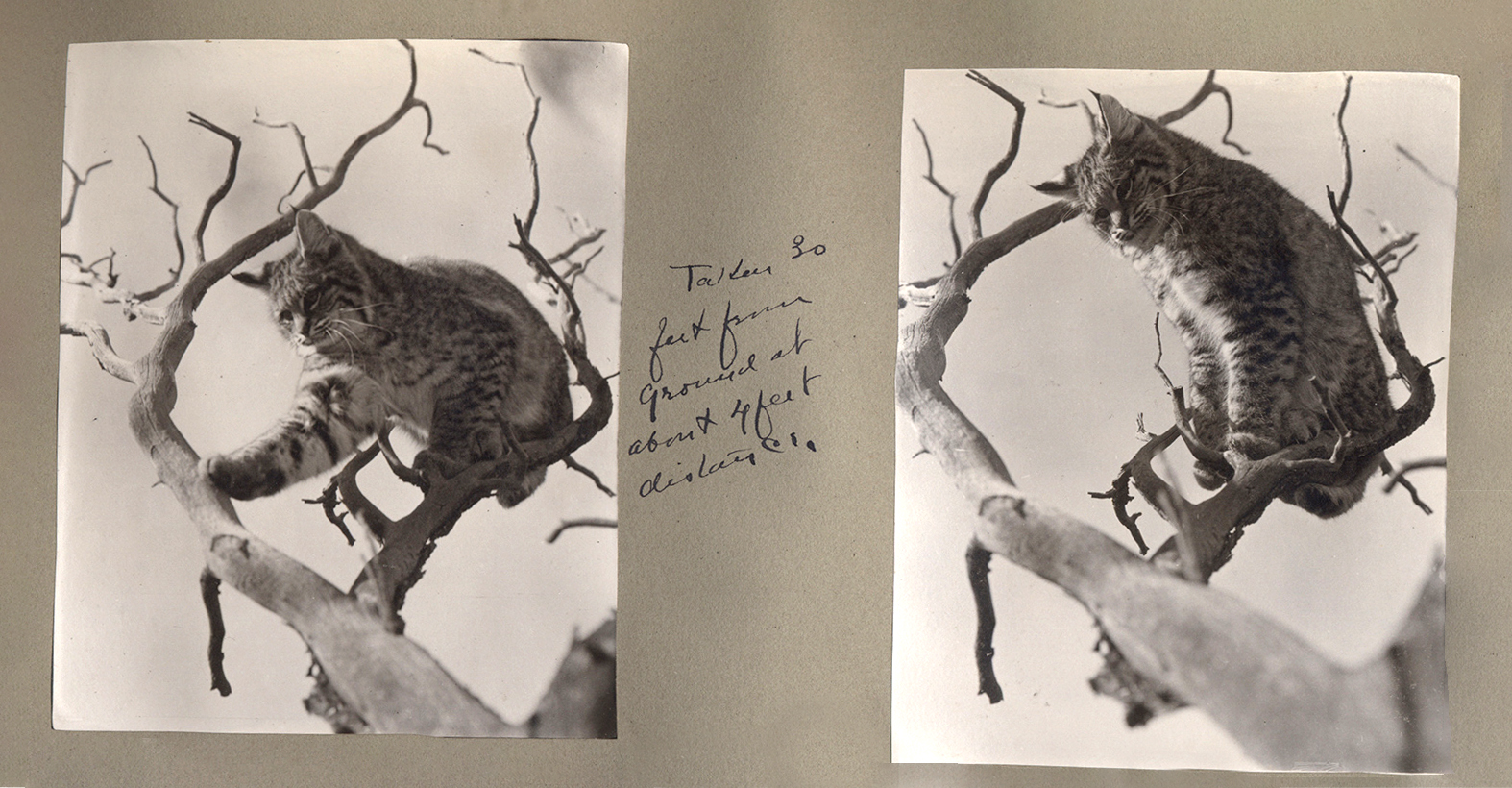
I assured him that the honor was appreciated, and said that my reason for being brief was a fear of keeping him from retiring early, as I knew he was very tired after his long hunt; but as this seemed no obstacle we settled down to a good old-fashioned talk that was only interrupted by the noise of the train or the balancing motion necessary to get an equilibrium as the coach sped around the curves at a rate of sixty miles an hour.
During the train ride to Denver we talked of many things connected with the hunt; of arms and ammunition, of the daring and gentlemanly demeanor of John Goff, the guide, of the kindness of the Colorado people, of the greatness of the state as a game and scenic country and many other things. During our chat he pulled down his rifle, took it from its leather case, and showed it to me with evident pride. It was a .30/30 Winchester, with heavy stock and open sights.
“I have given the gun much usage,” he said, and it looked it, for aside from the general appearance of having had much handling, it had four or five teeth imprints in the stock, large enough to place a pea in, made by a lion which showed fight when the governor went to stab it with a knife. “It is a good gun,” he remarked, “and I believe the .30/30 is plenty big and powerful enough to use on all the ordinary big game.” He entered into the caliber question with much earnestness, the above being his conclusions.
I received a fund of information from Governor Roosevelt on that ride, and while I did not “take notes,” yet I will attempt to epitomize some of the information in as brief a form as possible, believing that it will be of interest to the readers of Outdoor Life:
Governor Roosevelt has been fond of hunting and of the life of the frontier ever since his youth. He has written many interesting books on outdoor life, including Hunting Trips of a Ranchman and The Wilderness Hunter.
Big game hunting is his favorite sport, and bear and lion hunting he especially delights in. He has killed many bear, lions, wolves, coyotes, bobcats, etc., as well as antelope, black and white-tailed deer, elk, sheep, white goats and, in fact, all the game indigenous to the temperate zones. He has hunted in all the Western game fields, but never in Colorado before.
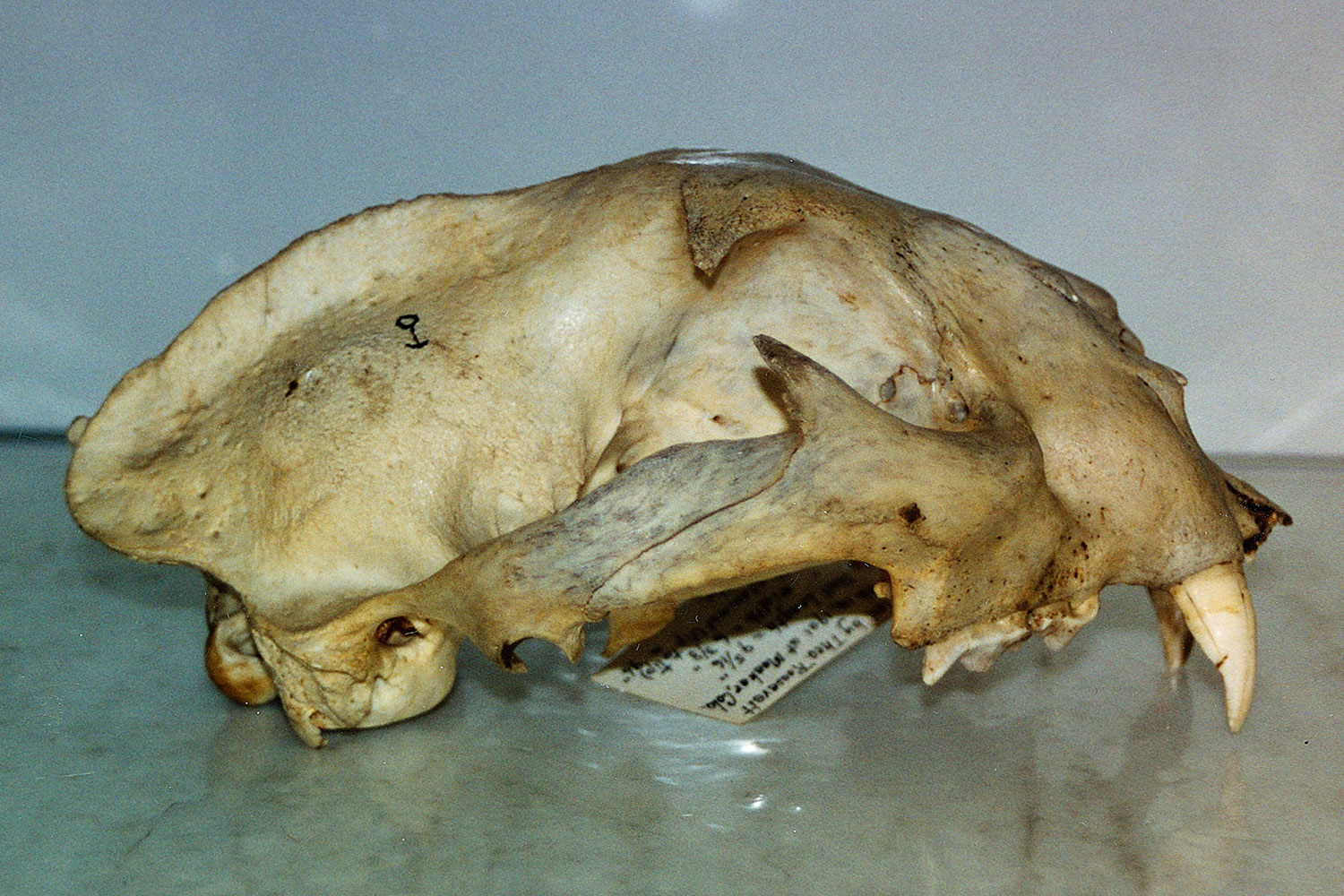
He always dresses in a buckskin suit while in the hills, and is one of the greatest admirers of good horseflesh in the country. He knows how to ride, too, as well as any cowboy of the plains, and has the endurance of one who is in the saddle every day.
All his game on his last hunt was weighed with a steelyards when killed. One lion weighed 227 pounds, another 164 and another 160. These were the three largest killed. The skins of all the game killed will be mounted in the best of shape for Governor Roosevelt’s den.
Governor Roosevelt is one of the most congenial, whole-souled men imaginable, and he makes one feel at home in his presence immediately. He dislikes formality, and loves earnestness and sincerity. His grasp is that of a warm-hearted sportsman, and his conversation and manner unusually friendly and pleasant. Our meeting afforded me one of the most delightful pleasures of my life.
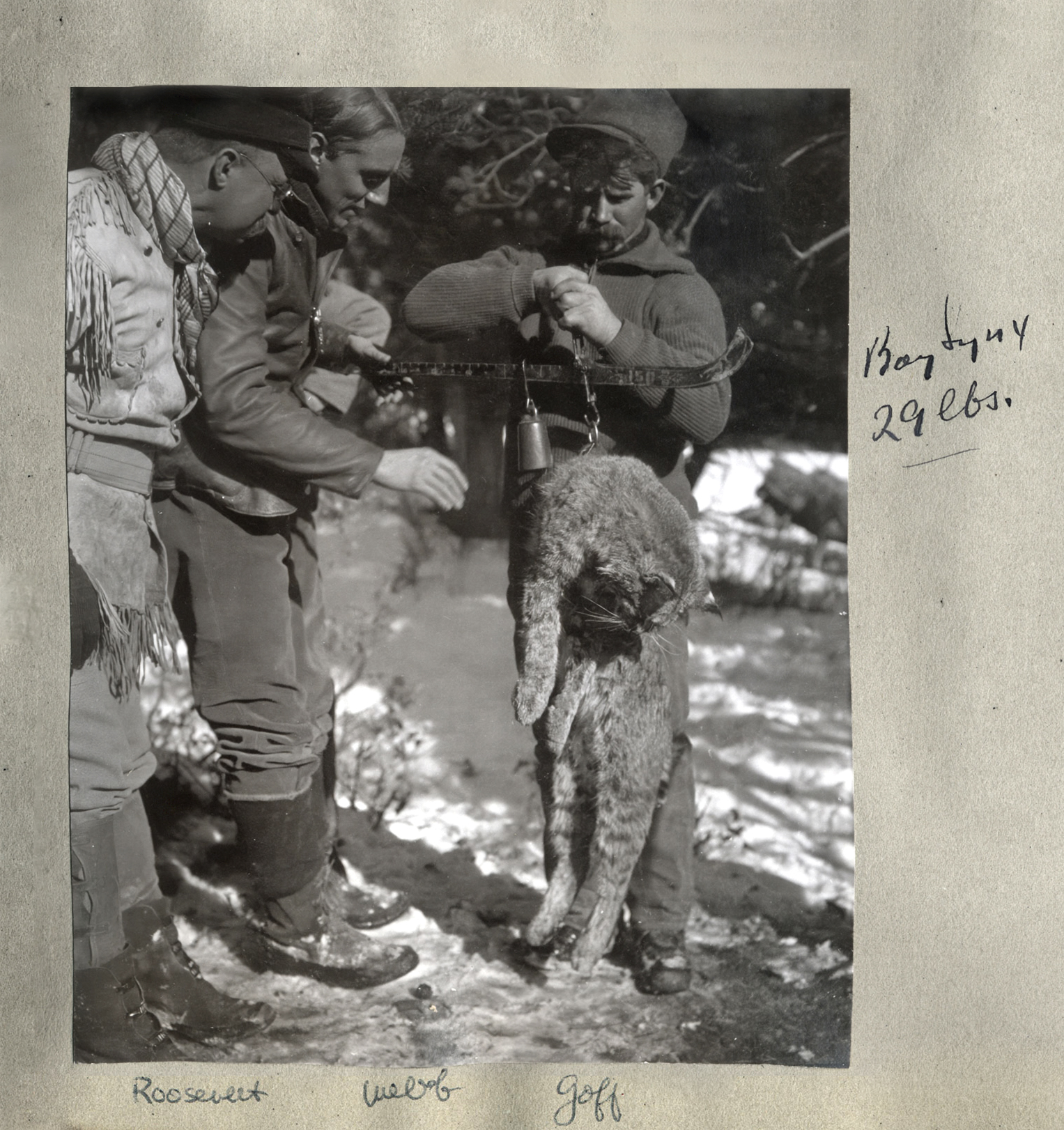
Believing that a personal letter received immediately after the hunt from John B. Goff, Governor Roosevelt’s guide, may be of much interest to the readers of Outdoor Life, I take the liberty of appending it herewith:
Meeker, Colo., Feb. 15, 1901.
Mr. J. A. McGuire, Editor Outdoor Life, Denver, Colo.
Dear Sir.—Governor Roosevelt has just left Meeker, having come in with me from the hunting grounds to-day. I believe he has had the most enjoyable hunt of his life, and I certainly shared in the pleasure.
I am sending you to-day some snapshots taken on the hunt, and a little later will send you some more, also an article for publication, giving a full account of the trip.
Governor Roosevelt killed twelve lions and five lynx on the trip. Four of the lions he stabbed with his knife while the dogs were holding them. Some of the newspaper people seem much excited over such “daring feats.” They seem to think this a favorite form of sport, but it is only done as the best practical method of quickly dispatching the animals, as it would be dangerous to shoot a lion while down and surrounded by half a dozen dogs, as one or more of the latter might be killed. Of course the animals are shot when possible, but often they jump from a tree and are surrounded by the dogs so quickly that it is hard to get in a shot.
One of the lions killed was the largest ever killed in this country, measuring eight feet in length and weighing 227 pounds. One of the photos sent shows him stretched on the ground.
On the arrival of the governor and party in Meeker on January 12, we started for the Keystone Ranch, where we hunted some weeks. The foreman of this ranch, William Wilson, treated us with every courtesy and kindness. From there we went to the Mathes ranch, where we stayed two weeks and got three lions. Bob Clarence and Zack Mathes have fine ranches, and showed us what true hospitality is.
From the Mathes ranch we went to Judge Foreman’s ranch, and spent a few pleasant nights with the kind and agreeable judge and his son, who soon made us feel perfectly at home.
Governor Roosevelt took the measurements and weights of all the game killed on the trip. He has some of the finest specimens of mountain lion ever seen in any country.
I will say in conclusion that I have hunted with a great many sportsmen, but found Governor Roosevelt one of the most thorough hunters and courageous sportsmen I have ever had the pleasure of hunting with. The five weeks I was with him was one long period of delights and pleasures. Very truly yours, JNO. B. GOFF.
This story has been minimally edited to meet contemporary standards. Read more OL+ stories.
